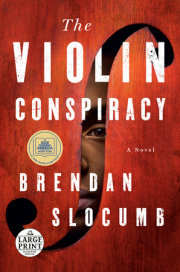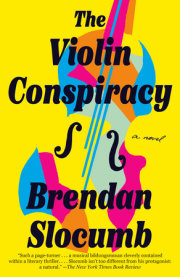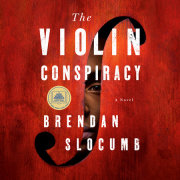Chapter 1
Day 1: White Chucks, Size 101/2
On the morning of the worst, most earth-shattering day of Ray McMillian’s life, he ordered room service: scrambled eggs for two, one side of regular bacon (for Nicole), one side of vegan sausage (for him), one coffee (for Nicole), one orange juice (for him).
Later, he would try to second-guess those choices and a thousand others that, in hindsight, vibrated in his memory: What if he’d ordered French toast instead of eggs? What if grapefruit juice instead of orange? What if no juice at all?
Breakfast had materialized before he’d gotten out of the shower. He’d lost track of time, caught up in the fingering of the Tchaikovsky Concerto’s triple-stops, and water sluiced down for ten minutes while he gaped at the tiny bar of hotel soap.
When he’d walked naked out of the bathroom, the aroma of bacon wreathed the suite. The breakfast tray was waiting on the tiny dining table, the dishes’ lids still in place. “I didn’t even hear them come in,” he said. If only every morning room service could magically deliver eggs and sausage.
Nicole was curled up in one of the armchairs, watching CNN. She twisted and untwisted a lock of auburn hair, the eighth-note tattoo above her wrist rhythmically flickering and disappearing. “You never hear anything.” Another bombing in Jerusalem, and a hurricane bearing down on Indonesia. “I have a confession,” she said, not looking away from the TV.
“What did you do this time?” She wasn’t looking at him, so he took a giant step forward and blocked her view of Indonesia. Gave her something else to look at.
“I stole five bucks from your wallet to tip her. Hope that was okay.” She eyed his nakedness. “You gonna eat like that?”
“Do I need clothes to eat?” He leered at her.
“This definitely works for me,” she said. “I was just trying to figure out if you were going to get dressed now or if you want to eat, or—”
“We need to be out of here within an hour. You need to finish packing.”
“I’m already packed,” she said. “You’re the snail in this race.”
Ray slid on underwear and a T-shirt, grabbed a plate of food, lay back on the messed-up bed. He propped the plate on his stomach.
Afterward, he relived all the other choices of the morning: cluelessly packing his suitcase, scouring the suite one more time, pulling up his roller bag’s handle. He slung the violin case over his right shoulder (should he have put it on the left?), gestured for Nicole to go first with her two roller bags. The door clicked shut behind them, sealing the suite—and what remained—inside.
Down the elevator, through the Saint Jacques lobby, checking out, tipping the doorman, who flagged down a cab for each of them: Nicole’s, first, to Penn Station. He hefted her suitcases into the trunk, leaving his own roller bag on the sidewalk, the violin case slung securely on his shoulder.
She turned to him, pressed her hand against his chest. Her warmth spread through his shirt, her touch like pizzicato—plucking violin strings with fingers he could feel shudder down his spine. “I meant to tell you,” she said, “when you’re playing the Mozart, I think you’re playing the second movement too fast. Just try taking it maybe two clicks slower? Really milk it.”
“You think? Because Ben Amundsen said to keep the tempo bright.”
“I know, but you play so much more passionately when it’s a little slower. Just a little. Try it, all right? For me?”
New York battered against them, cars zooming past, splashing last night’s rain onto the curb.
“Just come to Charlotte. Find a sub,” he said.
“You come to Erie,” she said.
“You know I have to practice—”
“You can practice just as easily in Erie.”
“I can’t. There’s Janice, there’s my space, you know I—”
She grabbed his head with both her hands, pulled him toward her, and leaned forward, so their foreheads touched.
He closed his eyes, breathed her in. “I’ll see you next week,” he said.
“You’ve got this. Rayquan McMillian, future Tchaikovsky Competition gold medalist. Just focus. Visualize it. You can totally do this, you know that? It’s going to happen.”
Another breath he could feel deep in his abdomen. He tilted forward to kiss her.
A voice from the cab: “Hey, buddy, you almost done there?”
Another moment ruined by New York City’s transportation system. Before he could kiss her, before he could even say “Call me when you get in,” she’d jumped into the back seat and the taxi door slammed and he stood there like an idiot as the car moved off into traffic.
But already the day was hammering at him, his taxi had rolled up, trunk popping open, and he was spilling into the back seat with the violin, his anxiety level rising again. He wanted to be through LaGuardia, back in Charlotte. This morning he hadn’t even practiced his music, so now he was itching to pick up his violin, assure himself that he could really make Tchaikovsky’s voice his own.
Only one month left until the competition began: the world’s most prestigious, most difficult classical music competition—judged by the top musicians in the world, as well as an online audience of millions of listeners. Even if he practiced every day, fourteen hours a day, he didn’t think he’d be ready. He resented wasting the time to fly home.
At the airport, he filed into the TSA PreCheck line. Had he only gone through regular security. Why had he been in such a hurry? He should have waited in the long queue. If he’d waited, the screener might have randomly pulled his suitcase aside or asked him to open the violin case. Someone would have noticed or asked; it was security, after all.
Instead he placed the roller bag on the conveyor belt, violin case behind it, and they sailed through the X-ray and he sailed through the body scan, oblivious.
Later, over and over, he replayed in his mind the next two hours: boarding Delta Flight 457, stowing his luggage (the violin case could manspread alone in the overhead bin), returning to Charlotte, home to his little house, the air musty and stale. He lay down on his bed for half an hour, grateful to be back, violin case on the floor next to him, where he always set it. He let the travel wash itself from his skin, into the air, felt himself getting centered. Getting focused, ready to play.
It was just after 2:00 p.m. on May 16 when he kicked himself off the bed. He stood up, took three strides across the room, picked up the violin case, and set it on his bureau.
He flicked open the left clasp, then the right, and the lid lifted back.
His violin was gone.
Inside sat a white tennis shoe: a Converse Chuck Taylor All-Star high-top canvas shoe, men’s, size 101/2.
Ray wore a size 12.
Poking out of the shoe’s mouth like an obscene tongue: a sheet of white office paper, folded in thirds.
He unfolded it.
SEND $5M IN BITCOIN FROM BISQ TO WALLET 34U69AAV89872
TRANSFER ON JULY 15 BETWEEN 12:00 PM EST–1:00 PM EST
YOU WILL RECEIVE NO FURTHER COMMUNICATION
Chapter 2
Day 1: Darkness
The next few hours were a blur, and all that he could remember afterward was how he’d repeatedly opened and closed the violin case. Every time he was absolutely certain—absolutely convinced—that if he opened the case one more time, this time—this time—the violin would be there, glowing, its tiger stripes shimmering like flames: because how could it not be there? Instead the obscenity of its empty mouth gaped back at him. Its barrenness was impossible, as if water were no longer wet.
He’d called the Charlotte police and none of it made sense: he was calling to say that the violin was stolen (but of course it wasn’t stolen, it was right in its case where it belonged). The house was filled with uniforms and pale faces turning toward him and then they were taking the violin case away from him—how could they take it away from him?—and for moments at a time he forgot how to breathe, as if the air had suddenly become something difficult and foreign. He was talking to New York police and the FBI and then he was on another Delta plane back to New York and it was impossible: because the violin was not on his shoulder and was not within arm’s reach and he couldn’t touch it. Its absence gaped on his back, where the case should have been slung.
The violin’s absence was like nothing he’d ever felt before. He could tell you the exact pressure that he should feel—that he should be feeling—of it against his jaw, knew the flare of its ribs the way he knew the flare of his own. His thumb should rest against its neck right where the wood darkened at the seam. The smooth roundness of its back was lit with orange and gold and brown, but those were words and couldn’t touch the reality of how the pattern rippled and called out to him in a voice that only he could hear. How could anyone say it was just a violin?
When he arrived back at the Saint Jacques, the hotel clerk—the skinny blonde who’d been so rude to him last year, so long ago, that first day—put him up in another suite on the same floor as his and Nicole’s previous suite. The police were in his old room, but they wouldn’t let him in. He wanted to show them exactly where he’d stood, where the violin case had rested, but the crime scene crew was dusting and measuring and keeping him out. It didn’t matter. The room had already been sanitized for the next guest: all the irreplaceable, priceless forensic evidence vacuumed, Windex’ed, bleached away.
He stood for a while outside the room, looking in, and then found himself back in this new alien suite. He had no violin case, which was just insane, because of course always near him was a violin case and a violin, inside. People—detectives, the hotel manager, the concierge, even Mike the doorman—would appear in the doorway to take Ray’s fingerprints or to ask an apparently random question: Did he have it in the elevator? Was he sure the housekeeper left with the breakfast cart? Over and over he repeated his story, every detail: practicing the afternoon before; dinner, drinks; back to the hotel, sleep, shower; breakfast, orange juice; flight.
There were Delta Airlines representatives. There were agents from the FBI Art Crime Team—Ray hadn’t known that an art crime team even existed. He couldn’t keep anyone straight and didn’t bother trying.
He tried not to snap at them: they were here to help. He tried to breathe but his ribs had been wrapped in piano wire. He tried to remain calm. He tried, very hard, not to cry.
“I’m telling you,” he kept telling them. “It was either my family or the Marks family. It had to be one of them. Go check them out.”
His words seemed to disappear into the air, to vanish unheard.
“We hear you, sir,” said a NYPD detective, a fit, muscled guy with cheekbones that looked sharp enough to puncture the skin. “I assure you we’re looking into it. We just want to get more information about your own movements. Yours and your girlfriend’s. When did you say she was coming back?”
When was Nicole coming back? Ray couldn’t remember. His hands were trying to hold on to something that wasn’t there. It was gone, of course it was gone. How could he have imagined that he could have kept it, that he was worthy?
Everything that everyone had ever thought about Ray—about people who looked like Ray—was now turning into reality with an inevitability that he almost welcomed, it was so expected. He was bringing their words to life. He was exactly what they said he was. Incompetent. Irresponsible. It was all true, true, true. He not only wasn’t good enough, but he’d never been good enough. He would always, now and forever, be the dumb nigger who lost the most important thing in his whole worthless life.
For hours he paced, roaming the bedroom and adjoining living room/kitchen/dining room, turning the television on and off, opening the door to ask the police officer outside if there’d been any news, if he could help. They’d taken his suitcase, taken the clothes he’d been wearing, and the T-shirt and jeans he now wore felt wrong, strange, not his.
Nicole called him again. Her flight was boarding in forty minutes; she’d been calling for an hour but he hadn’t picked up to talk. But suddenly the silence of the room hurt his ears and he was desperate to hear the sound of someone else’s voice—a voice saying something other than his own internal accusations. When her name flashed across the phone, he answered.
“Stop pacing,” she said to him.
“What are you—”
But she was talking over him. “Stop pacing. Sit down. Close your eyes. I’m here. Take a deep breath.”
He stood in the middle of the room, phone pressed tight to his ear. Tears burned as they slid down his cheeks, and he closed his eyes.
“Seriously. Sit down,” she said. “Listen to me. Take a deep breath.”
He sat, the mattress giving beneath him. He tried to breathe but his lungs no longer breathed air.
“You know, I really would have just come to Charlotte,” she said. “You didn’t have to do all this just to see me again. When you want something you really go for it, you know that?”
Despite himself he released a breath, a strangled guffaw, and suddenly the air was flowing into his lungs again. “Nicole, I—”
“It’s not your fault. You hear me? It’s not your fault.”
“It is, I—”
“It’s not. Nobody—nobody—could have taken better care of that fiddle. And you know what else? They’ll find it. You’re going to get it back. You will. I absolutely believe it.”
The tears were coming soundlessly, his breathing ragged, and he closed his eyes against the world, now reduced to the exact size and shape of her voice.
“Who’s there with you?” she asked.
“What do you mean? A bunch of cops.”
“Did you call Janice? Your aunt? Is anyone else coming?”
“I called Janice. I didn’t call the others. I couldn’t talk to them.”
“Not even your aunt Rochelle?”
“Especially not Aunt Rochelle.”
“Why? You should give her a call.”
Copyright © 2022 by Brendan Slocumb. All rights reserved. No part of this excerpt may be reproduced or reprinted without permission in writing from the publisher.









